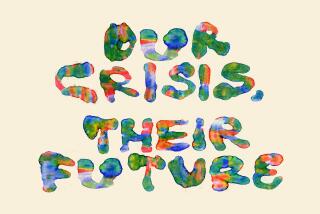Mail Call: Critics Gang Up, Suggest Tips to Save the Earth
- Share via
Ihave been thoroughly rebuked by environment-minded readers for expressing my confusion over what I can do to help save the Earth.
Specifically, I noted the debate over whether paper or plastic shopping bags are worse for the environment, an argument reminiscent of the debates over the effects on health of cholesterol, aspirin, coffee and beer.
Almost all my critics say that plastic and paper are equally bad and that one should acquire a cloth bag for carrying groceries home from the supermarket.
Russ Lesser of Hermosa Beach sent me four canvas shopping bags and recommended that my wife use them when she goes marketing. “At first,” he says, “my wife found it difficult to use these because she always seemed to forget them, and then when the checkout clerk asked her, ‘Plastic or paper?’ she would remember the canvas bags in the car. After a while . . . she found that they are much more convenient than the plastic or paper, and they also give you a good feeling because nothing goes into a landfill.”
My wife now has the canvas bags. We shall see whether she uses them or not.
Several readers suggested re-using plastic shopping bags. “I re-use mine as many as 15 or 20 times,” said Rusty Waldman of Marina del Rey. “You might suggest to your wife that she carry one folded up in her purse,” said Lauren Michele Seals of Encinitas. (I’m not sure I could get my wife to carry one in her purse.)
Ever since the city began a separate collection for cans and bottles, we have been conscientiously separating our trash into recyclable and non-recyclable trash containers.
I am also told that I can stem the flood of mail-order catalogues my wife receives by filling out a form at the post office or asking each house to desist.
That is out of my hands. As I said, my wife probably receives 30 catalogues a week. This seems like gross overkill to me, but she buys most of her clothes by mail order, and I suppose it is better than having her prowl the department stores and boutiques.
John Fries of Long Beach says, “Reduce, Re-use, Recycle” is the “fundamental creed” of environmentalists and all thinking people. This means, he says, that we must first reduce our consumption by not buying what we don’t need; second, re-use what we can, like plastic bags, and, third, recycle what is recyclable.
Fries calculates that if every driver in Los Angeles eliminated one five-mile car trip every month, that would eliminate 90 million miles of driving in a year, thus saving gasoline and reducing smog.
Valeria Provines of Arcadia writes that one ought to use completely biodegradable diapers (“they are available”) in times of drought and says cloth ones are OK otherwise.
As I said, the question of what diapers to use is immaterial in our household; also there is not much we can do to curb overpopulation, which several readers identified as the Earth’s main curse.
Walter K. Waymeyer of La Verne writes: “Encourage your children, if it is not too late, to have one child, or at most two children, (and to have them later, as that helps to slow population growth too).”
One of our sons has two children and the other three. Of course, they did not consult us. Perhaps our five grandchildren will limit themselves to one child each, but don’t expect me to recommend it.
Waymeyer points out that world population doubles every 30 to 40 years, thus doubling the use of resources and the production of noxious gases and containments.
Maurine Reedy Ruzek says the environmentalists leave her frustrated, because “no one ever gets down to the source of all our problems, and that is overpopulation. Unless we recognize this and do something about it, we are doomed.”
She adds: “The more people we have, the more crime, the more trash, the more traffic, the more pollution. . . . It becomes ludicrous to frantically separate bottles, cans, paper, plastic and all the other efforts going into saving the environment. . . . In my opinion the various religious hierarchies must come to grips with something more reassuring than the rhythm method.”
The facts of overpopulation, according to the Population Institute, are, indeed, appalling. The Earth’s population exceeds 5 billion. In the next generation, 3 billion young people will enter their reproductive years. By the year 2000, almost half the world’s forests will be gone; one-fifth of the world’s plant and animal species will be extinct.
Carol Benson Holst, co-chairman of Zero Population Growth’s multicultural task force, writes: “If we keep looking the other way, the loss of biodiversity on the planet will continue at the rate of a dozen species a day, and we will eventually be among the wonderful beasts to vanish.”
Perhaps young women, instead of carrying plastic bags in their purses, ought to carry something else.






